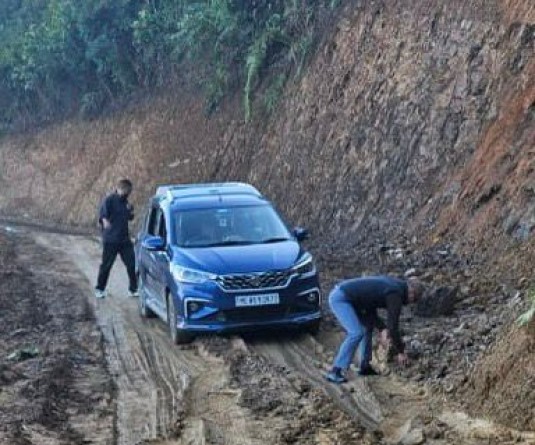
Every year, Clark Theological College Aolijen sends B.D.II students for holistic ministry to different parts of India especially the rural India. Our team consisting of four members were send to Wanchu Area from Dec.14 2007 to Jan.7 2008. Wanchu is the name of a Naga tribe living in Tirap district of Arunachal Pradesh. The Wanchu Baptist Churches Association (WBCA) is being established by the Ao Baptist Churches Association (ABAM) in 1977. They have celebrated their Silver Jubilee, and is still looked after by the ABAM. The field Director is Mr.Lima Lemtur.
We reached the WBCA Mission Centre on Dec.15. On Dec.18 and 19, four of us were sent to four different villages in Upper Wanchu area viz.Kaimoi, Ngissa, Wakka and Khanu Villages which are just at the India-Myanmar boundary. On reaching the villages, we were warmly welcomed by the village and church elders. Their hospitality is noteworthy. From Dec.19, we began our work.
In the beginning, we found it little difficult to adjust with their lifestlyes and cultures. The area is very, very rural and remote. In fact, they have a long, long way to reach a civilized society. They eat almost have cooked foods. The toilet they make is multipurpose i.e. upstair is toilet and downstair is pig sty. They also costruct houses with thatch only and there is not a single CGI sheet house in Khanu Village which has more than 200 houses, except the church building and the Pastor's quarter constructed by Tuli Baptist Church. They also construct houses without levelling the ground and so one will find ups and downs inside the house which has kitchen, bedroom, grinding place under single roof. You will not find windows and so the inside is very dark even at day time.
We were sorry to see the suppressed life of women. For them, women means a servant. They don't send girlchild to schools. Their work is just to go to field, collect firewood, grind maize and all other household chores. Exactly opposite are the menfolk who gather in Morung, keep chatting and continuously puff opium which they call 'khaini'. Majority of the menfolk inhake opium and they are also baptized christians. Opium is severely destroying their health, life, family and society. There are non-christians too in villages like Wakka. They still treasure and preserve human skulls and perform rituals on the skulls.
Another sad thing we observed was the disunity and disharmony among the christians especially between Roman Catholic and Baptist. Sheep stealing is frequent and a common phenomenon.
In this context, we did our ministry, teaching them hygiene, how to cook food, how to construct house, bathrooms and toilets and the like. In every home visitation, we told them the word of God and challenge them to give up opium. We were also actively involved inside the church preaching and teaching the word of God (not theological sermons but basic knowledge about God), and teaching them songs. We found teaching action songs more easier because there are many youths especially girls who have not even seen the verandah of a school, and so they memorize and enjoy action songs better. We help them In decorations too. Christmas tree was foreign to them.
We were very much blessed because their response was active and very encouraging. They really thirst for the word of God. Raja system (kingship) still exists and even the Raja and Ranis were eager to hear the word of God. Also seeing the shepherdless sheep, we are challenged to enlarge our territory of missionary mind and reach the unreach.
Dear fellow Christians and theological graduates, no one should say ' I don't have a calling' or 'I don't have a place for ministry'. The debate of unemployment among theological graduates will be relevant only after the whole world is evangelized. Indeed, we have seen with our naked eyes that the 'Harvest is plentiful but the labourers are few'. You be the one! Amen.
With Prayers.
Kevi, Sentinaro, Jaseng and Khalenmew Yim,
CTC Aolijen, Mokokchung




